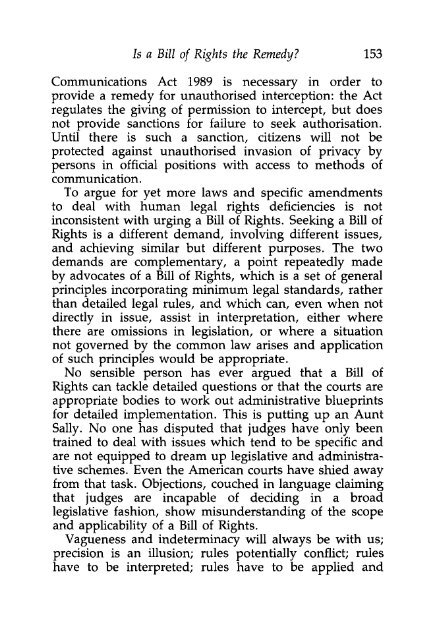The United Kingdom and Human Rights - College of Social ...
The United Kingdom and Human Rights - College of Social ...
The United Kingdom and Human Rights - College of Social ...
You also want an ePaper? Increase the reach of your titles
YUMPU automatically turns print PDFs into web optimized ePapers that Google loves.
Is a Bill <strong>of</strong> <strong>Rights</strong> the Remedy? 153<br />
Communications Act 1989 is necessary in order to<br />
provide a remedy for unauthorised interception: the Act<br />
regulates the giving <strong>of</strong> permission to intercept, but does<br />
not provide sanctions for failure to seek authorisation.<br />
Until there is such a sanction, citizens will not be<br />
protected against unauthorised invasion <strong>of</strong> privacy by<br />
persons in <strong>of</strong>ficial positions with access to methods <strong>of</strong><br />
communication.<br />
To argue for yet more laws <strong>and</strong> specific amendments<br />
to deal with human legal rights deficiencies is not<br />
inconsistent with urging a Bill <strong>of</strong> <strong>Rights</strong>. Seeking a Bill <strong>of</strong><br />
<strong>Rights</strong> is a different dem<strong>and</strong>, involving different issues,<br />
<strong>and</strong> achieving similar but different purposes. <strong>The</strong> two<br />
dem<strong>and</strong>s are complementary, a point repeatedly made<br />
by advocates <strong>of</strong> a Bill <strong>of</strong> <strong>Rights</strong>, which is a set <strong>of</strong> general<br />
principles incorporating minimum legal st<strong>and</strong>ards, rather<br />
than detailed legal rules, <strong>and</strong> which can, even when not<br />
directly in issue, assist in interpretation, either where<br />
there are omissions in legislation, or where a situation<br />
not governed by the common law arises <strong>and</strong> application<br />
<strong>of</strong> such principles would be appropriate.<br />
No sensible person has ever argued that a Bill <strong>of</strong><br />
<strong>Rights</strong> can tackle detailed questions or that the courts are<br />
appropriate bodies to work out administrative blueprints<br />
for detailed implementation. This is putting up an Aunt<br />
Sally. No one has disputed that judges have only been<br />
trained to deal with issues which tend to be specific <strong>and</strong><br />
are not equipped to dream up legislative <strong>and</strong> administrative<br />
schemes. Even the American courts have shied away<br />
from that task. Objections, couched in language claiming<br />
that judges are incapable <strong>of</strong> deciding in a broad<br />
legislative fashion, show misunderst<strong>and</strong>ing <strong>of</strong> the scope<br />
<strong>and</strong> applicability <strong>of</strong> a Bill <strong>of</strong> <strong>Rights</strong>.<br />
Vagueness <strong>and</strong> indeterminacy will always be with us;<br />
precision is an illusion; rules potentially conflict; rules<br />
have to be interpreted; rules have to be applied <strong>and</strong>

















